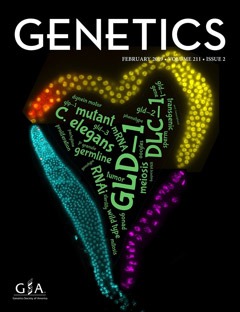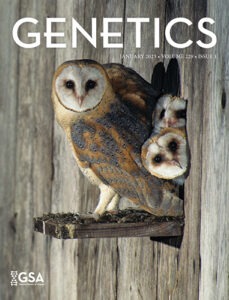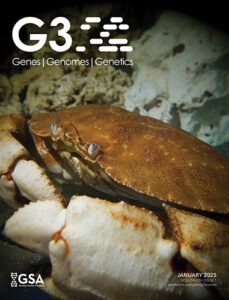Thank you for visiting the GSA booth.
We’re glad you stopped by to learn about the Genetics Society of America and our journals, conferences, and career development programming. Browse this page for easy access to the things we talked about.
Become part of GSA.
The Genetics Society of America is an international community of scientists who use the tools of genetics and genomics in our research.
Around half of our members are students and postdocs from more than 50 countries. These scientists hail from a wide range of disciplines—including cell biology, physiology, biochemistry, biophysics, neuroscience, developmental biology, evolutionary biology, and more.
GSA’s mission is to advance biological research by supporting professional development of scientists, communicating scientific advancements and fostering collaboration, and advocating for science and scientists. GSA achieves this through its various programming, most notably conferences focused on model organisms, and two peer-reviewed journals, GENETICS and G3: Genes|Genomes|Genetics.
Publish with the GSA Journals.
The GSA Journals are peer-reviewed, peer-edited, and published in partnership with Oxford University Press. Browse popular articles and check out the Genes to Genomes blog for coverage of papers published in the Journals.
GENETICS publishes high-quality genetics and genomics research that expands scientific boundaries—we’ve been building the field since 1916. With its broad readership, rich history, and responsive editors, GENETICS brings the latest in publishing innovations to the communities it serves.
Why Publish in GENETICS
Get your useful data out into the world by publishing in G3: Genes|Genomes|Genetics. G3 publishes high-quality foundational research, particularly studies that generate useful genetic information, such as mutant screens, genome sequence data, GWAS and QTL studies, software, data resources, and new methods.
Why Publish in G3Develop your skills.
GSA helps scientists develop their skills and achieve their career goals. We design programs and initiatives to provide experience, training, mentorship, and community.
Early Career Leadership Program
Develop your skills, join a thriving network, and demonstrate your abilities by participating in the GSA’s Early Career Leadership Program! In this online program, participants work in teams to propose, develop, and implement initiatives that address unmet needs for the early career scientist community. Participants have the opportunity to work on their writing skills, which includes the option to take a writing workshop tailored for the needs of early career scientists. Early career leaders complete the program with new skills, a network of peers and mentors, and concrete deliverables that demonstrate their abilities.
Applications will open in Fall 2026.
Peer Review Training Program
Get real-world peer review training and experience by participating in this innovative program! Peer reviewers are vital to science. Yet early career scientists in our field rarely receive formal training in how to be a good reviewer. GSA and the GSA Journals are addressing this gap with a program that gives early career members real-world peer review experience. Participants will receive online training and advice from GENETICS and G3 editors as they become reviewers for manuscripts submitted to the journal. Early career scientists from anywhere in the world are encouraged to apply. We particularly welcome applications from members who lack opportunities to receive peer review training in their home labs or departments.
Senior graduate students, postdocs, and early career scientists within 7-years of having earned their PhD are invited to apply. Applicants should have published at least one peer-reviewed manuscript, preferably as the first author.
Participants will review for both GENETICS and G3. Applications will open in Fall 2026.
Explore thematic series.
As part of our mission to serve our communities, GENETICS and G3 publish thematic collections spanning a broad range of topics. Updated as new articles are published, we invite additional articles on these topics and hope that they stimulate discussion and discovery.
Ongoing Series Accepting Submissions
Selfish Elements: Genetics of Natural and Synthetic Systems | Genetics of Bacteria | Opportunities and Challenges for Genomic Data Analyses in Biobanks
Genetic Models of Rare Diseases | Fungal Genetics & Genomics | Neurogenetics | Plant Genetics & Genomics
Multiparental Populations | Genomic Prediction
Celebrate community resources.
Genetics and genomics help connect biological findings across the tree of life, and research organisms are a key piece of the puzzle. When working in flies, worms, maize, yeast, fish, frogs, and more, researchers benefit greatly from community resources like databases, knowledgebases, and stock centers. Unfortunately, funding for these community resources isn’t a given. Citing them appropriately any time you use them in the course of your research is hugely important in making the case for their support. Each database and knowledgebase has citation guidelines on their website; for example, the Gene Ontology Consortium requests citation of the most recent update whenever authors use GO to perform gene set enrichment analysis.
For quick access to links to a variety of model organism databases, visit our Community Resources page.>>
Community spirit is an important facet of GSA’s mission, and we encourage our members to practice excellent stewardship of community resources! As G3 Editor in Chief Lauren McIntyre reminded us in a recent editorial:
Science is a team sport: citations are how we recognize members of the team
Delve into ancestry.
GENETICS and G3 have published a number of papers on topics related to ancestry and phylogeny, including examinations of ancestral recombination graphs (ARGs). See a selection below:
- A general and efficient representation of ancestral recombination graphs
- Evaluation of methods for estimating coalescence times using ancestral recombination graphs
- Efficient ancestry and mutation simulation with msprime 1.0
- ONeSAMP 3.0: estimation of effective population size via single nucleotide polymorphism data from one population
- OrthoPhyl—streamlining large-scale, orthology-based phylogenomic studies of bacteria at broad evolutionary scales
- Overview of the Saccharomyces cerevisiae population structure through the lens of 3,034 genomes
Dive into Genomic Prediction.
The landmark GENETICS paper by Meuwissen et al. in 2001 launched an entire field, and the GSA Journals continue to publish cutting-edge advances in Genomic Prediction.
Browse a selection of relevant papers from GENETICS and G3:
- PyBrOpS: a Python package for breeding program simulation and optimization for multi-objective breeding
- AlphaSimR: an R package for breeding program simulations
- Multitrait Bayesian shrinkage and variable selection models with the BGLR-R package
- Breedbase: a digital ecosystem for modern plant breeding
Read more from this ongoing series at the GSA Journals.>>
Pore over the potato.
In addition to being homes for model organism-centric research, GENETICS and G3 are proud to publish engaging science on all types of organisms. Feast your eyes on this selection of papers on potatoes—a globally significant crop and versatile, tasty side dish.
- Little heterosis found in diploid hybrid potato: The genetic underpinnings of a new hybrid crop
- Crossover shortage in potato is caused by StMSH4 mutant alleles and leads to either highly uniform unreduced pollen or sterility
- Genome Report: Genome sequence of 1S1, a transformable and highly regenerable diploid potato for use as a model for gene editing and genetic engineering
- Modeling genotype x environment interaction for single and multitrait genomic prediction in potato (Solanum tuberosum L.)
- A k-mer-based bulked segregant analysis approach to map seed traits in unphased heterozygous potato genomes
- Genomic prediction of heterosis, inbreeding control, and mate allocation in outbred diploid and tetraploid populations
- SpudDB: a database for accessing potato genomic data
Explore Genome Reports at G3.
G3 launched the Genome Report article type in 2016 to allow for the rapid review and publication of genomic data—and we’ve published over 300 since then! We’re proud to fill a community need and to help authors share their high-quality sequencing data.
Since the journal was launched to serve the community, the G3 Editorial Board is committed to making the Genome Reports experience top-notch for authors; the editors have spent the last year enhancing the Genome Reports review process, ensuring that it is in step with technological advances and prioritizing fairness, balance, and a streamlined experience.
G3 now has a dedicated team of Editors who oversee peer review of Genome Reports. To learn more about the structured peer review process, check out the editorial from Genome Reports Senior Editor Noah Whiteman:
Genome reports: enhancing rigor, reproducibility, and relevance
Editor in Chief Lauren McIntyre recently published an editorial highlighting the important role Genome Reports (and other genomic research) can play in supporting the conservation efforts:
Reporting on genomes of endangered and threatened species supports conservation
G3 publishes across the tree of life; read on for a selection of Genome Reports and Investigations that exemplify G3’s commitment to publishing genomic data:
- The groundnut improvement network for Africa (GINA) germplasm collection: a unique genetic resource for breeding and gene discovery
- Conserving a threatened North American walnut: a chromosome-scale reference genome for butternut (Juglans cinerea)
- A haplotype-resolved, chromosome-scale genome for Malus domestica Borkh. ‘WA 38’
- A genome sequence for the threatened whitebark pine
- A chromosome-scale assembly for ‘d’Anjou’ pear
- Disentangling cobionts and contamination in long-read genomic data using sequence composition
Create a dialogue at G3.

Dialogue and Debate is a new G3 article type intended to provide robust scholarly discourse on a timely topic where there is uncertainty about the “best” approach. The goal is to engage in a focused, scholarly discussion on an unresolved or puzzling set of observations and/or to discuss and share development of best practices. Check out these recent examples:
Don’t BLUP Twice
James B Holland, Hans-Peter Piepho
G3: Genes|Genomes|Genetics. December 2024; 14(12).
DOI: 10.1093/g3journal/jkae250
Splitting model fitting into two stages is often necessary when performing GWAS for large-scale datasets. Holland and Piepho have words of caution for use of random effects in the first stage. Their argument, while specific for GWAS in plant breeding, has broad implications for best practice in genomic prediction studies, and researchers interested in GWAS, genomic prediction, and genetic risk scores can find much value in the discussion.
When is it subfunctionalization and when is it not?
James A Birchler
G3: Genes|Genomes|Genetics. January 2025; 15(1).
DOI: 10.1093/g3journal/jkae269
If you have thoughts about the impact of two-stage modeling in other contexts or on determining subfunctionalization for a duplicate gene pair, consider authoring a response D&D to add to the community conversation. Presubmission inquiries are encouraged.
Reach out to g3-gsa@thegsajournals.org for more information on proposing a D&D.





